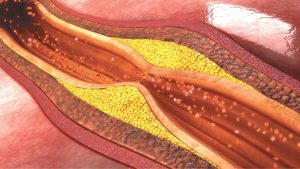 Atherosclerotic Cardiovascular Disease (ASCVD)
Atherosclerotic Cardiovascular Disease (ASCVD)
ASCVD also called “atherosclerosis,” occurs when fatty deposits build up in the arteries. Arteries carry blood and oxygen from the heart to the rest of the body, and all organs in the body need this flow of oxygenated blood to work.
If one of these fatty deposits, also known as a plaque, builds up inside an artery, it’s harder for the blood to get through. A plaque can block the segment of the artery where it develops. Or a piece of the plaque can break off, travel through the bloodstream, and block a different blood vessel. Plaques can occur in any artery. But they’re most dangerous when they affect vessels that supply blood to the heart, brain, aorta, arms, and legs.
Atherosclerosis contributes to Heart Disease and Stroke
Both the heart and brain depend on oxygen to function normally. When plaques in the arteries that supply the heart or brain limit blood flow, they can lead to a lack of oxygen for these organs. A heart attack or stroke can occur when the lack of oxygen is severe enough.
Heart disease
Arteries that bring blood to the heart are called “coronary arteries.” If one of the coronary arteries is too narrow, the heart doesn’t get enough oxygen. This can lead to chest pain (angina), shortness of breath, dizziness, or nausea. But the symptoms can vary. Some people don’t have symptoms at all, or they don’t realize their heart is in trouble. A heart attack occurs when the lack of oxygen is severe enough to damage heart muscle.
Stroke
Plaques can also occur in the carotid arteries of the neck. These arteries bring blood to the brain. The smaller blood vessels within the brain can also become narrow or blocked. The symptoms of this narrowing or blockage can include trouble speaking, sudden confusion, problems with vision or balance, or weakness in a part of the body.
These all can be signs that a part of the brain isn’t getting enough oxygen. When these symptoms are temporary, it’s called a transient ischemic attack (TIA). If the lack of oxygen is severe enough to damage brain cells, it’s called a stroke.
Treatment for Atherosclerosis
Prevention and treatment of cardiovascular disease both start with a healthy lifestyle. Dietary habits that help to prevent heart attacks and strokes include eating fewer unhealthy fats — like red meat and processed foods — and eating more whole grains, fruits and vegetables, and healthy fats (like fish, nuts, and olive oil). Regular movement and exercise are also significant. The American Heart Association recommends 150 minutes of exercise each week. Quitting smoking! Most people with ASCVD will also take medications to slow down artery damage.
Medications can help prevent and treat cardiovascular disease as well. There are many factors that can lead to a high chance of having a heart attack or stroke. Statin medications can treat lipids by slowing down plaque formation and stabilizing existing ones as well as taking an aspirin daily can help. Most recently the FDA has approved an add-on therapy in the form of an injectable to lower cholesterol to help high-risk adults. A healthcare provider should discuss the risks and benefits of medications with you.
Leqvio
LEQVIO is an option for patients with ASCVD. It is an injectable prescription medicine used along with diet and other lipid-lowering medicines (statins) in adults who need additional lowering of “bad” cholesterol (LDL-C) and have known cardiovascular disease and/or heterozygous familial hypercholesterolemia (HeFH), an inherited condition that causes high levels of LDL-C. It is not known if LEQVIO can decrease problems related to high cholesterol, such as heart attacks or stroke.
With LEQVIO, people in clinical studies given LEQVIO lowered their bad cholesterol (LDL-C) more and kept it low by 50% during a 6-month period. Your body works to remove bad cholesterol naturally, and LEQVIO helps your body remove more plaque for those with high cholesterol.
Sage Infusion Can Help
At Sage Infusion, we provide expert patient-centered infusion care in a contemporary boutique environment. Sage Infusion eases your medical burdens by handling the care coordination process, including insurance authorization and patient progress updates. Our flexible scheduling meets our patient’s needs with extended hours. Day, night, and weekend appointments are available. Our physician assistants and nurse practitioners follow the National Infusion Center Association guidelines and our proprietary clinical protocols. Sage Infusion offers a variety of comforting amenities, and patients can choose to receive treatment in the open lounge or a private room.
With locations in Fort Myers, Clearwater, Orlando, Sarasota, Tampa, and The Villages, Sage Infusion offers the best infusion and administration facilities in the Sunshine State. At Sage Infusion, we’ve reimagined patient care. From a quick start, to upfront pricing and financial assistance, to compassionate care by our clinical experts in a serene environment, you will experience infusion therapy like never before. Sage Infusion accepts most insurance providers and will complete your prior authorization process to help you focus on getting better.
Sage Infusion
(239) 533-5962 | sageinfusion.com/swwellness
8880 Gladiolus Drive, Suite C-200
Fort Myers, FL 33908










